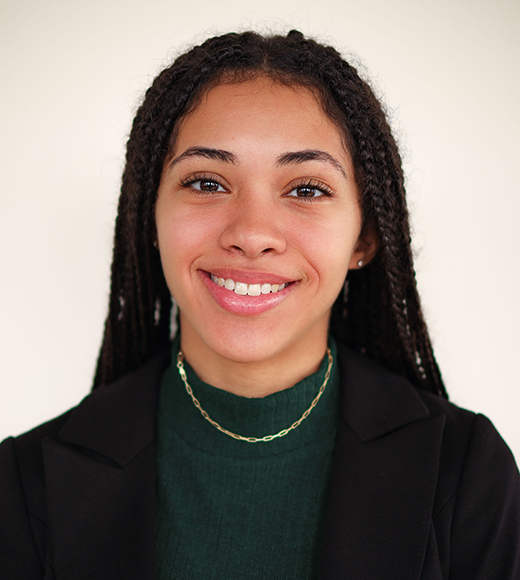Student Q&A: Jillian Lynk (She/Her)
Jillian is a third-year law student focused on Intellectual Property (Copyright and Trademark) and Entertainment Law. Hailing from Michigan, Jillian graduated from a small private liberal arts college, Kalamazoo College. Jillian is currently a member and past board member of the Black Law Students Association (BLSA), the copyright chair for the Intellectual Property Law Society (IPLS), and the 3L representative for the Entertainment Sports Law Society (ESLS).

Q: What motivated you to pursue a law degree, and why did you choose UCI Law?
I felt like studying law was the perfect combination of all my undergraduate concentrations (English, Sociology, Psychology, and Political Science), as I had always been interested in understanding how things work. I chose UCI Law largely due to their focus on clinics and pro bono as well as the strong sense of community.
Q: What has been your proudest accomplishment so far at UCI Law? (or what do you hope to accomplish?)
My proudest accomplishment so far at UCI Law has definitely been my work on the "Rap on Trial: A Legal Guide" in the Intellectual Property Arts and Tech (IPAT) Clinic. I had the opportunity to travel to Washington, D.C., in the fall of 2022 to meet with legislators and discuss why change is needed in how creative expression is used in criminal trials. Additionally, I had the opportunity to work with the Black Music Action Coalition on their Music Industry Report, which was a wonderful experience. The report tracked how market leaders and organizations have fulfilled their promises to promote racial justice and diversity.
My proudest accomplishment so far at UCI Law has definitely been my work on the 'Rap on Trial: A Legal Guide' in the Intellectual Property Arts and Tech (IPAT) Clinic.
- Jillian Lynk, 3L
Q: You recently contributed to the second edition of "Rap on Trial: A Legal Guide" as part of the IPAT Clinic. How was your experience?
My experience working on "Rap on Trial: A Legal Guide" was so meaningful. I had a great time during my first semester and I returned as an advanced clinic student. The second edition had very important changes that I was grateful I was given space to work on. It included a section on implicit bias and media studies that trace and identify potential biases that can impact these cases. My work in the IPAT Clinic provided me with valuable experience in Entertainment Law and introduced me to numerous people in the industry.
Q: What advice would you give to prospective students who are thinking about going to law school?
I'd recommend that prospective law students connect with current law students to gain real insights into the school's community. Once enrolled in law school, it's important to build a reliable support system both within and outside the school. Explore different areas of interest while in law school, and don't feel like you need to know exactly what you want to do before you begin. Remember that professors and current 2L or 3L students want to help you! Join organizations that align with your interests, and take the opportunity to network with professionals while still in school.
